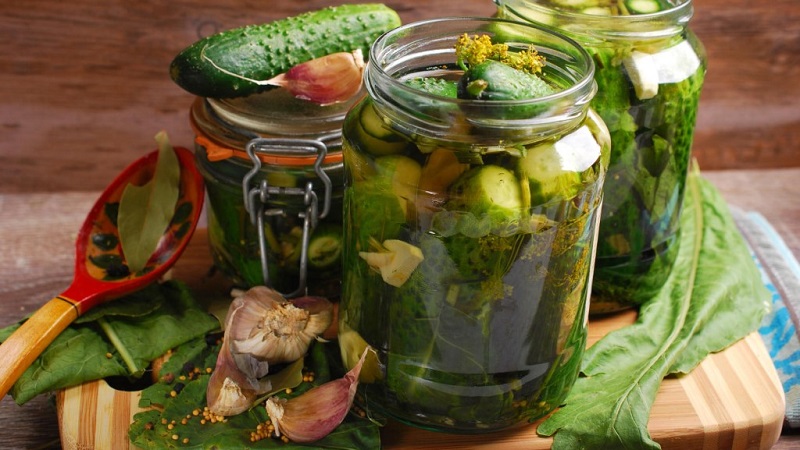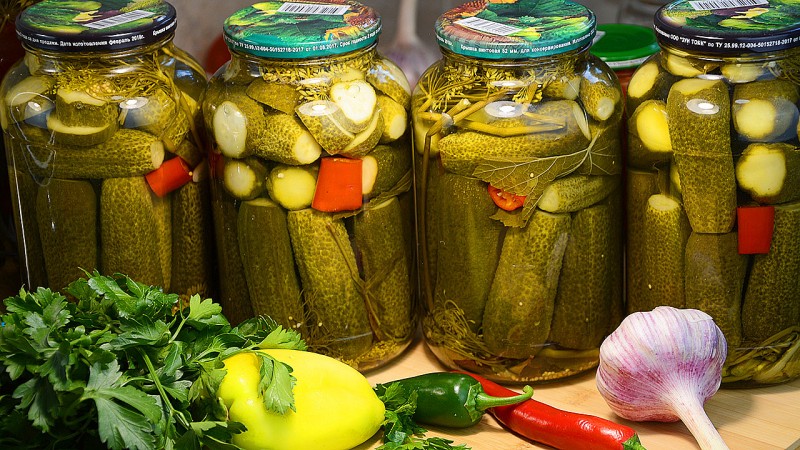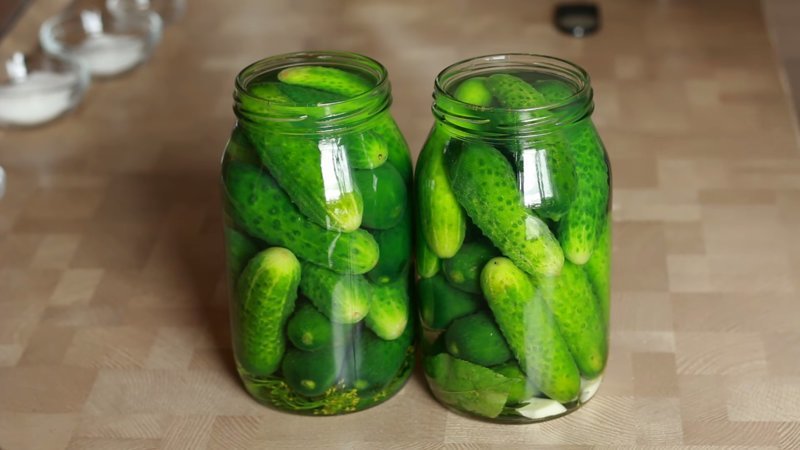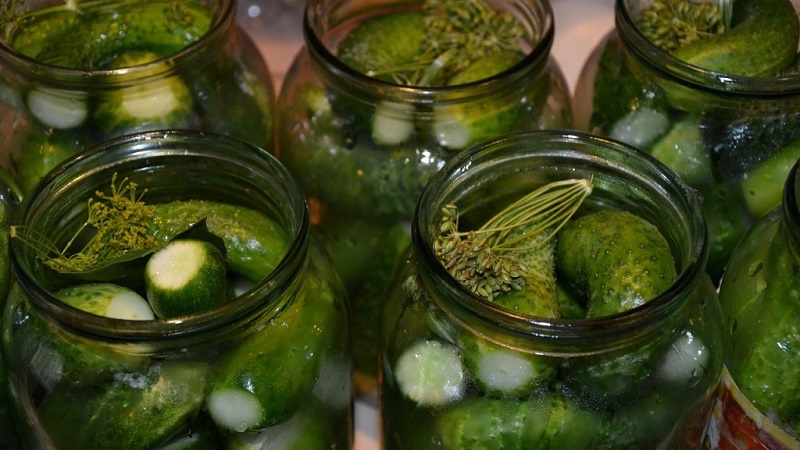Salting cucumbers for the winter in jars so that they don't explode: recipes, rules for preparing vegetables and storing blanks
Even housewives with many years of experience in canning vegetables at home sometimes explode twists. How to protect yourself from wasted labor and make sure that not a single bank is lost? Learn to make delicious cucumbers quickly and correctly.
The content of the article
Why cans of pickles explode
The only one cause - the presence of microbes under the lid. They also cause the fermentation process with the release of gases. At first, the brine becomes cloudy, then the lid begins to swell.
If the can is in the closet or on the mezzanine, where the hostess does not often look, eventually an explosion occurs. The lid rips off the neck of the can: there are too many gases, and they find a way out in the weakest point.
How to salt to prevent cans from exploding
Microorganisms that cause the fermentation process do not withstand high temperatures, therefore, when preparing canned food for the winter, housewives thoroughly wash containers and lids, and then sterilize them. Vegetables are also pretreated, including heat.

Features of the preparation of cucumbers
The fruits are soaked in cold clean water for 2-6 hours. If the cucumbers were taken from their own garden and were not lying anywhere, 2 hours is enough. Fruits bought on the market are placed in water for 6 hours - in this case, it is impossible to know exactly how much time has passed since they were harvested.
Even fresh cucumbers absorb moisture during soaking. But such preparation is needed not only so that they acquire elasticity, but also to fill possible internal cavities (voids) with moisture.
On a note. For pickles and pickles pick thorny cucumber varieties. Many housewives soak them immediately, without pretreatment. Ideally, before immersion in water, the fruit is thoroughly rinsed with a soft brush to remove dirt and dust between the pimples, and then the tips are trimmed on both sides.
Also, when cutting off the edges, it becomes possible to see if the cucumber is infected from the inside by some disease or pest.
Rules for the sterilization and spinning process
Sterilize containers and lids properly to prevent bacteria from surviving inside the rolled up cans. There are many ways to disinfect, but whichever one you choose, the cans are pre-washed with baking soda or a cleaning agent. The hostesses have adapted to doing this procedure using:
- microwave ovens;
- multicooker;
- steamer;
- ovens.
All these methods of sterilization are good in their own way, but the simplest and most reliable is for a couple, as our grandmothers did.
A small saucepan, 1/3 filled with water, is put on the fire and covered with a special stopper - a device with a round hole, the diameter of which is designed for a standard neck of any can. Sterilize with steam by placing containers upside down.
Sterilization time depends on the container volume:
- half-liter cans are kept over steam for 5-10 minutes;
- liter sterilized for 15-20 minutes;
- three-liter - 25-30 minutes.
After removing the sterilized can from the stopper, do not place it upside down on a towel. Some housewives believe that in this way they will protect the dishes from bacteria, but this is a misconception.
Neither containers nor lids should come into contact with anything after sterilization. This is especially true for lids. They do not take long to sterilize, so start 5 minutes before tightening.
During the laying of spices and cucumbers, some of the bacteria will get inside the jar and on the rim of the neck. In the process of canning, they will die if everything is done correctly:
- In a jar with cucumbers and spices, pour a thin stream of boiling water to the very top and cover with a lid.
- Let it sit for 10 minutes, then drain the water into a saucepan and boil it for 3 minutes.
- Pour the vinegar into the jar and pour the marinade over to the eyeballs.
- Remove the lid from the pot of boiling water and immediately place it carefully on the neck of the jar (excess marinade will pour out from under the lid).
- Tighten the screw cover with a kitchen towel, and a simple one - roll it up with a special machine.
Place closed jars upside down on a spread kitchen towel and cover them to cool gradually. Turn the seams over to ensure they are sealed.
Cucumber pickling recipes that won't explode

The method of harvesting cucumbers by salting is a win-win in terms of storage. During the fermentation process, lactic acid bacteria are produced. They produce lactic acid, which has disinfecting properties and therefore kills harmful bacteria.
Cucumbers are salted in cold and hot ways. In the first case, the jars will have to be stored in a cellar or refrigerator under a plastic lid. When salting with a hot method, jars of cucumbers are closed in the same way as when pickling, and they are perfectly stored in apartment conditions.
Use our recipes for pickling cucumbers for the winter in jars so that they do not explode and cloudy.
Cold salting
By this method used in Russia initially. Salted cucumbers in those days in oak tubs. This method has survived to this day in villages, whose inhabitants have spacious cellars. City housewives adopted the method of salting in 3-liter jars. To make the cucumbers in glass containers crisp, horseradish, oak and cherry leaves are added to the brine.
Hot salting
Salted cucumbers also - in 3-liter jars and with the same set of spices. The hot one differs from the cold method of salting only in that at the end of the active fermentation process, the brine is poured from the cans into the pan, boiled and, pouring back, roll up the containers with tin lids.
Regardless of which of the ways the zelents were salted, hot or cold, the salting method itself is also called barrel, because if all the rules are followed, cucumbers are obtained exactly like from a barrel.
Cucumbers in jars "Like barrel"
This recipe for pickled cucumbers is extremely simple: in addition to fruits, you only need salt, water, garlic, dill umbrellas, horseradish, oak and cherry leaves:
- Place a horseradish leaf, an umbrella of dill and a few cloves of garlic at the bottom of the jar.
- Arrange fresh, prepared cucumbers as tightly as possible, as much as will fit in a jar.
- In the process of laying, add 2-3 cherry and oak leaves.
- Lay another horseradish leaf and a dill umbrella on top.
- Dissolve 100 g of coarse salt in a mug with clean drinking water and pour into a jar of cucumbers.
- Top up to the very top with plain drinking water, close the plastic lid and turn the jar in your hands several times so that the fresh water mixes well with the salt water.
- Remove the lid and, turning it over, simply place it on the neck of the can.
- Put a jar of cucumbers in a bowl and incubate at room temperature for 72 hours.
During fermentation, a film forms on top. It is removed, water is added to the edge, the jar is closed with a suction plastic lid and stored in the refrigerator.
Important. Unrolled banks with pickled cucumbers stored in a cool, dark place to slow down the fermentation process and prevent peroxidation.
Pickled cucumbers "Bulgarian style"

This recipe is especially popular among those who remember the taste of the cucumbers sold during the Soviet era. For a liter jar you will need:
- 700 g gherkins (it is advisable to take fruits no longer than 6 cm);
- 1 small onion;
- 3 cloves of garlic;
- 5 allspice peas;
- 3 bay leaves;
- 4 tsp granulated sugar;
- 2 tsp coarse salt;
- 4 tbsp. l. alcoholic vinegar (9%);
- half a liter of water.
Preparation:
- Place the spices and onion sliced into rings at the bottom of the sterilized jar.
- Above is compact - gherkins.
- Pour boiling water over the contents of the jar, cover and leave for 10 minutes.
- Drain the water in a saucepan, add salt and sugar, bring to a boil and cook until they are completely dissolved.
- Pour vinegar into a jar of cucumbers, then pour the marinade to the top and then roll up.
Citric acid recipe
Sometimes citric acid is used for preservation instead of vinegar. The main thing is to properly dilute the powder so that you get the desired concentration in the end. A full-fledged substitute for the usual alcoholic vinegar (9%) will turn out if you take 2 tbsp for 100 ml of warm boiled water. l. crystals. Use such a solution in any pickled cucumber recipes in the quantities indicated for the vinegar.
Storage conditions
Rolls made according to all the rules are stored without problems at home at room temperature. To reduce the risk of swelling and bursting of cans, do not store them near heating appliances.
An ideal option for placing blanks in an apartment is a closet or storage room in the hallway. The place is away from radiators and protected from sunlight, and these are the most important conditions for long and safe storage of any home preservation.
Important! No matter how high-quality and conscientiously the twist is made, home conditions are far from industrial, therefore, it is advisable to use pickled or pickled cucumbers within a year from the moment of harvesting.
Tips from experienced housewives

And finally, some tips from experienced housewives:
- To prevent the seams from exploding, add mustard seeds, which are sold in 20 g bags, to the marinade.
- Mustard seeds intended for planting cannot be used - they will only provoke the fermentation of the marinade.
- To improve the taste of pickled cucumbers, add 50 ml of vodka to a 3-liter jar (used when salting hot).
- Vodka is also used for pickled cucumbers. The proportions are the same as for salty - 50 ml per 3 liter jar.
- Instead of alcoholic vinegar, apple cider vinegar (9%) is added to the marinade.
- Salt is suitable only coarse and not iodized.
- The marinade is prepared with a margin, since some of the liquid is lost during boiling and pouring.
Conclusion
In contrast to industrial preservation, our own blanks do not contain various additives with E-codes. In her pickled cucumbers, no housewife will put a sugar substitute or an enhancer of taste and aroma. And the vast majority of vegetables for winter harvesting are mainly used from their own garden. Well, the last argument in favor of your own spins is a significant saving in the family budget.